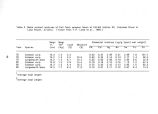| OCR Text |
Show III. J. 2. Management alternatives. Alternative A: No action Existing programs ( such as the National Contaminant Biomonitoring Program) from other agencies would continue to monitor the levels of heavy metals found in game fish of Lake Powell. Alternative B: Basic monitoring ( preferred alternative) Intermittent monitoring of heavy metals in targeted game fish would be conducted. Fish species and location of sampling would be coordinated with ongoing monitoring programs. While existing monitoring programs completed by other agencies provide valuable information, they do not address the issue of heavy metals in edible portions of major game fish. Cooperation would be sought with other agencies on future monitoring objectives, heavy metal monitoring, and fishery management. . If monitoring results indicate a potential health hazard from steady consumption of Lake Powell fish, public education programs would be developed. Alternative C: Intensive study and monitoring A lake- wide study in cooperation with other agencies would be conducted to compare heavy metals in various fish species to earlier post- impoundment studies. New studies would be initiated to locate trace metal concentrations and the extent of their distribution. Studies on fishery management would be considered if contaminated populations could be identified and isolated. Heavy metals in game fish muscle would be frequently monitored, plotted, and interpreted. Periodic reports displaying the location and content of contaminated fish and the risks of ingestion would be released to cooperating agencies and to the public. 111. J. 3. Recommended course of action. Alternative B is recommended, in which Glen Canyon NRA would continue to support the USFWS National Contaminant Biomonitoring Program of biannual sampling of bottom and game fish. Such long- term monitoring is useful in indicating trends of heavy metal concentrations in whole fish. In addition, NPS would support periodic surveys of mercury and selenium contamination ( and possibly that of other heavy metals) of the edible portions of striped bass and other game fish. Imposing consumption limits on large game fish or managing the fishery for a lower mercury or selenium contamination might become advisable if the results of the study show a continued increase of these metals in Lake Powell. 49 |








































































































